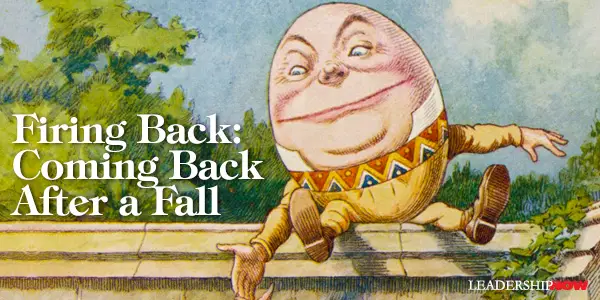 |
 |
02.28.07

Firing Back: Coming Back After a Fall
HAVE YOU EVER had a major setback? No. I didn’t think so. Me neither. But in the unlikely event you do or in the more likely event that you know someone who has or will, Jeffrey Sonnenfeld and Andrew Ward have created a well-researched guidebook. Firing Back: How Great Leaders Rebounded After Career Disasters strives to help us through the approaches that have worked for some and those that have backfired on others. Leaders should not be measured by how they bask in the gratification of their accomplishments. Rather, they should be measured by how they respond when fate deflates the joys of hard-earned triumphs. How well do they pick themselves up and get back in the race. The most important thing is to put your defeat into the proper context. This is often difficult to do in a culture that sees failure as a very bad thing and finds it difficult to even discuss. They write, “It is, in fact, wrong to consider adversity a diversion off one’s path toward greatness. The subsequent resilience from calamities has been revealed as vital to the character formation and differentiation of heroic figures…. It is the ability to bounce back from adversity—to prove your mettle once more by getting back into the game—that separates the lasting great from the fleeting greats.” They have developed a five-step strategy for rescuing and restoring your career and reputation—a leader’s most valuable asset—after a devastating professional setback. 1. Fight not Flight. This doesn’t mean to come out swinging, but to face the reality of the situation. “To stand up to the reality of the situation and not to flee from it or shirk the battles that lie ahead in restoring the reputation and career of the leader." Being able to pick your battles is an important component here. In the Wall Street Journal, Peggy Noonan opined in an article entitled, Ford Without Tears these comments about the comeback and legacy of Gerald Ford. He seemed lacking in vanity. There is no evidence that he was obsessed with his legacy. He didn't worry and fret about whether history would fully capture and proclaim his excellence, and because of this, he didn't always have to run around proving he was right. He just did his best and kept walking. What a grown-up thing to do. Former, current and future presidents would do well to ponder this approach. History would treat them more kindly. The legacy of a man who spends his time worrying about his legacy is always: He worried about his legacy.2. Recruit Others into Battle. This assumes you haven’t burnt your bridges. Build strong relationships now. You need to take responsibility for innocent close colleagues who suffer collateral damage with you and then leverage your support networks to reaffirm your credibility through the voices of others. Support from friends and family “can be very influential in reducing the levels of stress felt by the individual suffering from career setback and in encouraging coping behaviors. 3. Rebuild Heroic Stature. Explain the true nature of the adversity. Provide a rational explanation of the context behind any injustice or provide authentic contrition over any missteps you made. 4. Prove Your Heroic Mettle. Regain trust by demonstrating that the setback has not destroyed your professional expertise and character strength. Actions speak louder than words. 5. Discover a New Heroic Mission. Don’t merely define yourself by your past success or failure. Rather, define a new leadership vision and a new path for personal meaning in your work. You may find that you transcend past triumphs. In all of this they caution: Indeed, for many people, the failure to come back successfully is caused by an exclusive focus on the immediate problems of dealing with downfall—often practical and financial constraints that consume the person’s energy and will. 
Posted by Michael McKinney at 12:06 AM
|
BUILD YOUR KNOWLEDGE
 

How to Do Your Start-Up Right STRAIGHT TALK FOR START-UPS 
Grow Your Leadership Skills NEW AND UPCOMING LEADERSHIP BOOKS 
Leadership Minute BITE-SIZE CONCEPTS YOU CAN CHEW ON 
Classic Leadership Books BOOKS TO READ BEFORE YOU LEAD |